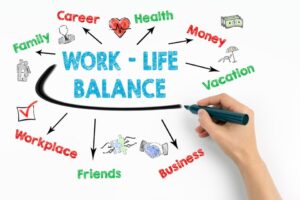Achieving a healthy work-life balance is essential for overall well-being, yet many people struggle to find the right equilibrium between their professional and personal lives. The demands of work, coupled with personal responsibilities, can often lead to stress, burnout, and a lack of fulfillment. Finding the right balance is not just about working fewer hours but about making the most of both work and personal time in a way that promotes happiness and productivity.
Work-life balance is different for everyone, depending on individual responsibilities, career goals, and personal values. However, certain principles and strategies can help anyone create a more sustainable and fulfilling lifestyle. This article explores practical tips to achieve a healthy work-life balance and maintain long-term success in both professional and personal aspects of life.
Understanding Work-Life Balance
Work-life balance refers to the ability to effectively manage time and energy between work responsibilities and personal activities. It’s about ensuring that neither work nor personal life overwhelms the other, allowing for a harmonious and fulfilling existence. A healthy balance means having enough time to meet professional goals while still prioritizing personal well-being, family, hobbies, and relaxation.
An imbalance can lead to stress, exhaustion, and dissatisfaction in both areas of life. Overworking can result in burnout, decreased productivity, and strained relationships, while neglecting work commitments can hinder career progress and financial stability. Striking the right balance is key to achieving long-term happiness and success.
The Consequences of Poor Work-Life Balance
Failing to maintain a proper balance between work and personal life can have serious consequences on mental, physical, and emotional health. Some of the common negative effects include:
-
Increased stress and anxiety: Constantly working or thinking about work can cause chronic stress, leading to anxiety and emotional exhaustion.
-
Burnout: Overworking can result in burnout, causing feelings of fatigue, irritability, and a lack of motivation.
-
Reduced productivity: Contrary to popular belief, working excessive hours does not always lead to higher productivity. Exhaustion and stress can lead to decreased efficiency and mistakes.
-
Strained relationships: Neglecting personal time can put a strain on relationships with family and friends, leading to disconnection and loneliness.
-
Physical health problems: Poor work-life balance can lead to unhealthy habits such as lack of sleep, poor diet, and reduced physical activity, which can increase the risk of serious health issues.
Practical Tips for Achieving Work-Life Balance
Achieving a healthy work-life balance requires intentional effort and the ability to set clear boundaries. The following practical tips can help create a more sustainable and fulfilling balance between work and personal life:
Set Clear Boundaries
One of the most effective ways to achieve work-life balance is by setting boundaries between work and personal time. If possible, define working hours and stick to them. Avoid bringing work home or answering emails outside of office hours unless necessary. Communicate boundaries with colleagues and supervisors to ensure expectations are managed.
For remote workers, having a dedicated workspace at home can help create a separation between work and leisure. Physically leaving the workspace at the end of the workday can signal to the brain that it’s time to shift focus to personal life.
Prioritize Time Management
Good time management is essential for balancing work and personal responsibilities effectively. Planning daily and weekly schedules in advance can help prioritize important tasks while avoiding unnecessary stress.
Use productivity techniques such as the Pomodoro Technique, time blocking, or to-do lists to stay focused and prevent work from spilling into personal time. Avoid multitasking, as it can reduce efficiency and lead to increased stress.
Learn to Say No
Many people struggle with work-life balance because they take on too many commitments. Learning to say no to unnecessary work obligations, meetings, or social engagements that do not add value can help free up time for more important tasks and personal activities.
Saying no is not a sign of laziness or incompetence; it is about setting priorities and ensuring that energy is spent on what truly matters.
Make Time for Self-Care
Taking care of personal well-being is just as important as meeting work deadlines. Prioritizing self-care activities such as exercise, meditation, reading, or engaging in hobbies can help reduce stress and improve overall health.
Regular physical activity, in particular, plays a key role in managing stress and maintaining energy levels. Even a short daily walk, yoga session, or workout can have a significant positive impact on mental and physical health.
Nurture Relationships
Maintaining strong personal relationships is an essential aspect of a balanced life. Spending quality time with family and friends can provide emotional support and improve overall well-being.
Schedule regular social activities, whether it’s having dinner with family, going out with friends, or simply calling loved ones. Building meaningful connections outside of work can create a sense of fulfillment and happiness.
Unplug from Work Regularly
Technology has made it easier than ever to stay connected to work, but it has also blurred the boundaries between professional and personal life. To achieve a better balance, it is important to unplug from work regularly.
Set specific times to disconnect from emails, phone calls, and work-related messages. Taking breaks from screens and work notifications allows the mind to recharge and prevents burnout.
Consider implementing “digital detox” hours where work devices are turned off, allowing for uninterrupted relaxation and time with loved ones.
Take Breaks and Vacations
Regular breaks throughout the workday can help maintain focus and reduce stress. Short breaks can prevent mental fatigue and increase productivity.
Additionally, taking vacations or time off is essential for mental and physical well-being. Many people hesitate to take time off due to work pressure, but vacations provide an opportunity to rest, recharge, and return to work with renewed energy and motivation.
Find Work That Aligns with Personal Values
A major factor in achieving work-life balance is finding work that aligns with personal interests, values, and lifestyle preferences. People who enjoy their work and find meaning in what they do tend to have a healthier relationship with their professional lives.
If work feels overwhelming or unfulfilling, consider evaluating career goals and making changes if necessary. Sometimes, a career shift, flexible work arrangements, or seeking a new job can significantly improve overall happiness and balance.
Practice Mindfulness and Stress Management
Mindfulness practices, such as meditation, deep breathing, or journaling, can help manage stress and increase self-awareness. Practicing mindfulness allows individuals to stay present in the moment rather than constantly worrying about work or personal responsibilities.
Simple breathing exercises or mindfulness techniques during stressful moments can help create a sense of calm and perspective, reducing anxiety and improving focus.
Conclusion
Achieving a healthy work-life balance requires consistent effort, but it is entirely possible with the right approach. By setting boundaries, managing time effectively, prioritizing self-care, and nurturing personal relationships, individuals can create a lifestyle that supports both professional success and personal happiness.
Work-life balance is not a one-size-fits-all concept; it varies for each person based on personal and professional goals. However, by making conscious choices and implementing practical strategies, it is possible to maintain a fulfilling and sustainable balance. The key is to find what works best and make adjustments as needed to ensure long-term success and well-being.




